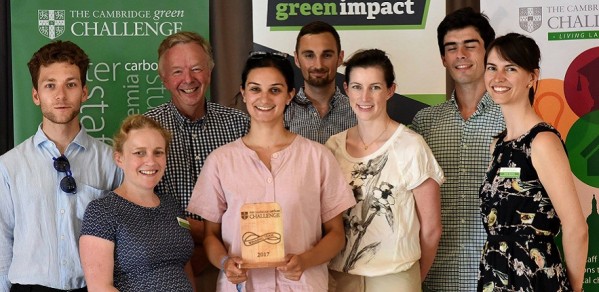
Plant It Green, a team comprising of Melanie Jans Singh and fellow Future Infrastructure and Built Environment Centre for Doctoral training students Mark Allen and André Neto-Bradley, has been awarded £24,000 in the Carbon Challenge Award.
This project feeds into all of our research and will be used as a test bed for this novel and new concept.
Mark Allen
The Cambridge Carbon Challenge is a competition inviting staff and students to submit their ideas for reducing building energy use and associated carbon emissions (Scope 1 and 2 emissions) across the University estate. The University is committed to reducing its carbon emissions from energy use and becoming carbon neutral from energy use by 2050.
The competition is a joint initiative by the Living Laboratory for Sustainability and the Energy and Carbon Reduction Project (ECRP). It aims to harness academic expertise and operational experience from across the University that will help us to improve our environmental performance and increase our capacity to reduce carbon. It will give participants the opportunity to collaborate with others from across the University, develop project management skills, receive mentoring from experts, and gain experience in developing a business case.
The team's vision is to integrate hydroponics into the new Dyson Building on the Engineering site to reduce Building Energy Use and associated carbon emissions.
Securing an initial grant of £700 from the university Estates department, they set about recycling wooden pallets into modular units capable of supporting a hydroponics plant system. They also utilised space on the rooftop to build a greenhouse for seedling growing space and will be collecting data on how different plants affect air quality characteristics in office spaces.
The plan is to install more of these hydroponics modules across each office floor, using them to grow vegetables and herbs, while simultaneously improving air quality and reducing the need to ventilate the space. This could save on energy and heat required for ventilation by up to 35% and potentially reduce the Dyson Building's CO2 emissions by 74 tonnes. Melanie, a passionate urban farmer, also hopes to create a community of plant growers.
Melanie, Mark and André are honoured to win the Cambridge Carbon Challenge with their idea of incorporating hydroponic plants into offices to reduce energy consumption and the subsequent carbon emissions. The £24,000 will fund hydroponic units, plants and the sensors. They would like to thank all of the judges for their guidance, in particular Professor Peter Guthrie and Emily Dunning for their support throughout the process.

